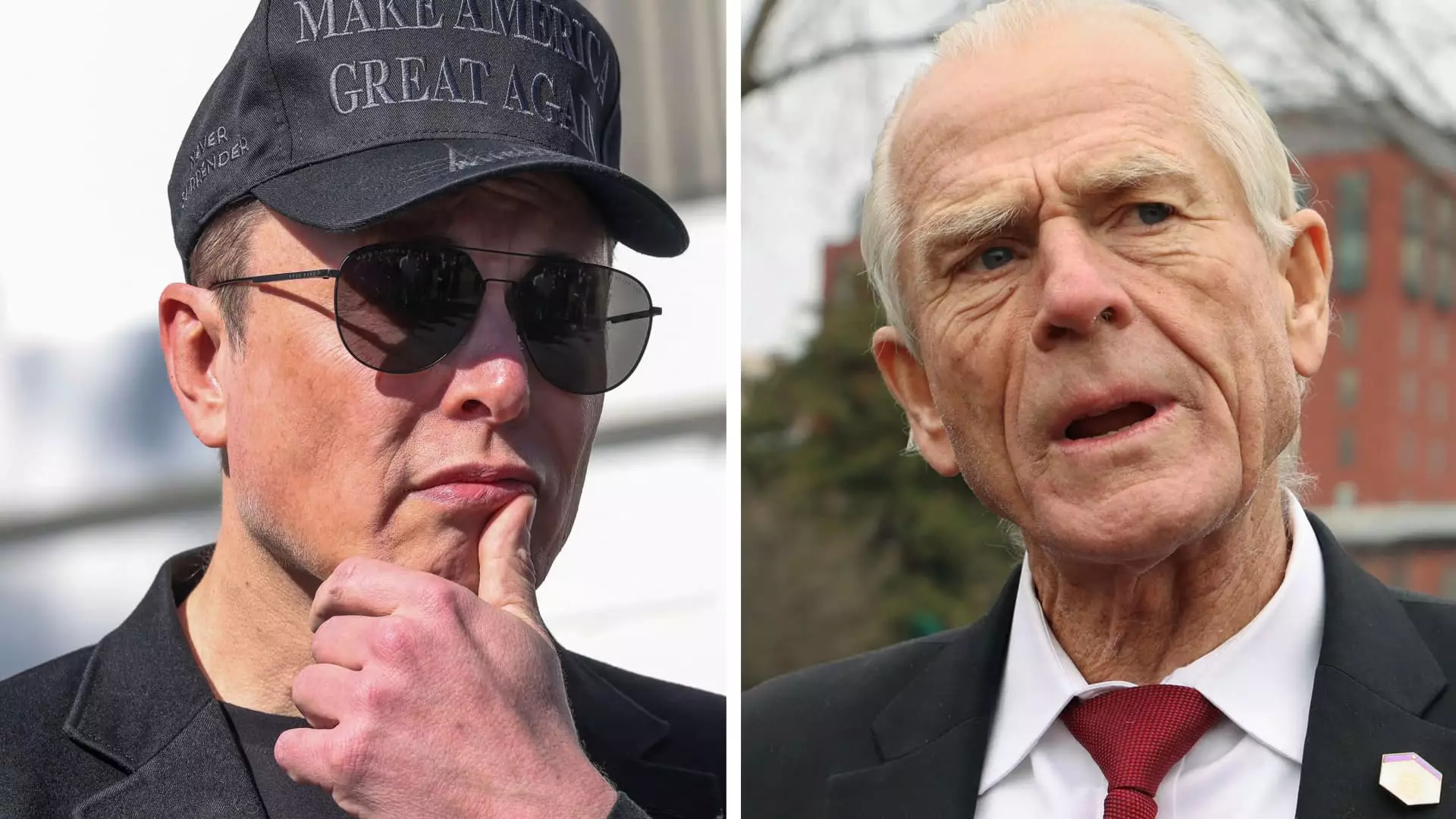In an increasingly volatile economic landscape, the past few weeks have revealed stark divisions at the heart of U.S. trade policy, particularly for industry titan Elon Musk. As Tesla’s stock has seen a staggering 22% decline over four trading days, the world’s wealthiest man has turned his ire towards Peter Navarro, a central figure in the Trump administration’s trade discussions. This confrontation marks not just a personal squabble but also signifies a larger rift regarding the implementation of tariffs and their repercussions on American enterprises, particularly in the electric vehicle (EV) sector.
Musk’s derision for Navarro isn’t just casual banter; it’s a response to what Musk perceives as fundamental misunderstandings of the automotive industry. By dismissing Navarro’s credentials—a Harvard PhD in economics—Musk suggests that traditional economic theory may blind one to the dynamic realities of modern industry. This is not merely about personal insults; Musk is attempting to defend the innovative approach Tesla embodies as it forges a new path in EV manufacturing. For him, the implications of tariffs impact not only his bottom line but the entire shift toward sustainable transportation.
Tariffs Under Fire: A Strangling Grip on Innovation
Despite his past connections with Trump, Musk appears to be positioning himself against the administration’s aggressive tariff policies. The implementation of steep tariffs covering over 180 countries has raised significant concerns within the business community, calling into question the viability of domestic manufacturing in a deeply interconnected global economy. While Navarro labeled Tesla as merely a “car assembler,” Musk countered with a bold assertion that the very essence of Tesla’s operations is rooted in innovation and not simply assembly lines. The fear is that broad tariffs could stifle such innovation, pushing companies like Tesla toward higher production costs and ultimately, increased prices for consumers.
The irony is palpable; Musk’s growing challenges parallel those of a company caught in the crossfire of ideological battles that threaten its very existence. Analysts had previously argued that Tesla might withstand tariffs better than its competitors due to domestic assembly, yet the reality of inflating costs for essential materials remains an ominous cloud hanging over Tesla’s ambitions. America’s reliance on foreign suppliers for key components like circuit boards places Musk in a precarious position, one where his ambitious vision may become impeded by political decisions.
A Vision Beyond Borders: Musk’s Call for Free Trade
Adding another layer to this complex narrative, Musk’s propositions during a recent event resonated with a starkly different vision for trade—one advocating for zero tariffs between North America and Europe. This perspective diverges sharply from the inward-looking stance of the current administration. Given Tesla’s substantial manufacturing footprint in Berlin and Musk’s broader ties to European markets, this push for free trade reflects a pragmatic understanding of the interdependencies that manifest in global supply chains.
The looming question remains: can Musk’s visionary leadership navigate through the oppressive bureaucracy and tariffs catalyzed by a protectionist agenda? His personal wealth—diminished as the market reacts to his corporation’s struggles—adds pressure to the need for innovative solutions that transcend current trade barriers. In embracing a zero-tariff policy, Musk is not just advocating for Tesla’s best interests; he is articulating a broader vision for economic cooperation that could reinvigorate the EV market amid tumultuous times.
Internal Struggles: Dancing on Thin Ice
The tumult at Tesla is further compounded by Musk’s controversial political affiliations and actions. His substantial financial commitment to Trump’s political ventures and high-profile role in the Department of Government Efficiency underscore a complex legacy back home. Amid the fallout from his political rhetoric, Tesla has faced boycotts, protests, and even criminal disruptions aimed at its facilities, hinting at an adverse reaction fueled by Musk’s polarizing figure.
These challenges frame Musk not only as a business leader but as a public persona under siege, caught in a whirlpool of emotion and complexity. The dissenting voices surrounding him amplify existing fears about the future of the company and its role in a rapidly evolving automotive landscape. Ultimately, the combination of economic pressures, conflicting trade policies, and Musk’s ongoing verbal sparring with Navarro poses significant questions. How resilient can Tesla be as it navigates these treacherous waters, and will Musk’s defiance bear fruit, or will it lead to his undoing amidst rising tensions and criticism?

